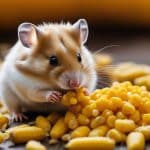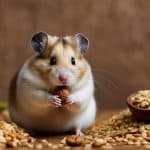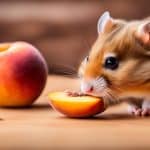Hamsters are adorable little pets that bring joy to many households. As responsible pet owners, it’s essential to provide them with a healthy and balanced diet. But can hamsters eat peaches? Let’s explore this question and discover some safe feeding tips for your furry friend.
Key Takeaways:
- Hamsters can eat peaches in moderation as part of their diet.
- Peaches are a good source of vitamins for hamsters, such as vitamin A and vitamin C.
- Always wash peaches thoroughly, remove pits, and serve them in small quantities.
- Avoid canned and dried peaches due to their added sugars and preservatives.
- Consult with your veterinarian to ensure a balanced diet for your hamster.
Suitable Hamster Diet
When it comes to the diet and nutrition of your hamster, it is crucial to provide them with a balanced and wholesome meal plan. Hamsters require specific nutrients to maintain their overall health and well-being.
In order to meet their nutritional needs, a balanced hamster diet should include:
- 15-25% protein
- 35-40% carbohydrates
- 4-5% fat
- 5% crude fiber
The easiest way to ensure your hamster receives a proper diet is by feeding them commercial hamster food. These specially formulated foods consist of a blend of pellets, seeds, grains, fruits, and vegetables, providing a comprehensive range of essential nutrients.
Commercial hamster food is designed to meet the specific nutritional requirements of hamsters, making it the ideal option for providing a balanced diet. However, it is important to consult with your veterinarian to determine the appropriate brand and type of commercial food for your hamster.
Additionally, introducing Timothy hay into your hamster’s diet a few times a week can have numerous benefits. Not only does Timothy hay offer the necessary fiber for proper digestion, but it also helps maintain healthy teeth by providing the necessary chewing exercise.
By offering your hamster a suitable diet consisting of commercial hamster food and occasional Timothy hay, you can ensure they receive all the essential nutrients needed for a healthy and thriving life.
Feeding Peaches to Hamsters
While hamsters can enjoy peaches, it’s important to serve them in moderation due to their high sugar content. Offering peaches as a treat can provide some variety in your hamster’s diet, but they should not make up a significant portion of their food intake.
The frequency of feeding peaches to your hamster depends on their breed. Dwarf hamsters should only receive a tiny, paw-sized amount of fresh peach every 2 weeks. On the other hand, Syrian and Roborovski hamsters can have a paw-sized portion once a week. Remember, moderation is key to maintaining a healthy balance.
When serving peaches to your hamster, it’s crucial to remove any pits. Peach pits hold no nutritional value and can pose a choking hazard to your furry friend. Additionally, uneaten peach should be promptly removed from your hamster’s enclosure within 24 hours to prevent spoilage.
It’s also worth noting that hamsters have specific dietary needs, and a well-rounded diet is essential for their overall health. Along with peaches, provide them with a balanced diet that includes commercial hamster food, which contains the necessary nutrients. Always consult with your veterinarian to determine the best diet plan for your hamster’s specific requirements.
By following these guidelines and feeding peaches to your hamster in moderation, you can provide a tasty and nutritious treat while ensuring their overall well-being.
Avoiding Canned and Dried Peaches
When it comes to feeding peaches to hamsters, it’s important to avoid canned and dried varieties. Canned peaches are typically packed in syrup with high sugar content, which can be detrimental to your hamster’s health. Even canned peaches packed in water still have higher levels of sugar compared to fresh peaches. Similarly, dried peaches should be avoided due to their concentrated sugar content. To offer frozen peaches to your hamster, opt for fresh frozen peaches without added sugars or preservatives.
It’s essential to prioritize your hamster’s health by providing them with fresh and nutritious options. Avoiding sugary fruits like canned and dried peaches helps maintain a balanced and healthy diet for your furry friend.
Considerations when Feeding Peaches to Hamsters
When feeding peaches to your hamster, there are a few important considerations to keep in mind. By following these guidelines, you can ensure the health and safety of your furry friend:
- Thoroughly wash the peaches: Before offering peaches to your hamster, make sure to wash them thoroughly. This will help remove any bacteria or pesticides that may be present on the fruit. It is especially important to wash non-organic peaches, as they may have a higher risk of pesticide residue.
- Remove the skin: If the peaches you have are not organic, it is advisable to remove the skin before serving them to your hamster. This is because the skin is more likely to contain pesticides, and it’s best to minimize your hamster’s exposure to harmful chemicals.
- Remove uneaten peach: Uneaten peach should be removed from your hamster’s enclosure within a few hours. This will help maintain cleanliness and prevent the peach from spoiling. It is important to keep a clean environment for your hamster’s overall well-being.
- Avoid peach pits: Never give peach pits to your hamster. Peach pits have no nutritional value for hamsters and can pose serious dangers. They can cause choking or lead to digestive issues if ingested. Always ensure that your hamster does not have access to peach pits.
By following these considerations, you can safely incorporate peaches into your hamster’s diet as an occasional treat. Remember, moderation is key, and consulting with your veterinarian is always a good idea when introducing new foods to your hamster’s diet.
Conclusion
Hamsters can enjoy peaches as an occasional treat, along with other safe fruits like apples and bananas. However, it is important to note that peaches should not be a dietary staple for hamsters due to their high sugar content. While peaches provide beneficial vitamins such as vitamin A and vitamin C, excessive sugar intake can lead to health issues for your furry friend.
To ensure your hamster’s nutritional needs are met, it is recommended to offer a balanced diet of commercial hamster food. These specially formulated foods are designed to provide the necessary nutrients in the right proportions. Small amounts of fresh fruits and vegetables can be added as supplements, including the occasional peach treat.
Remember to consult with your veterinarian before introducing new foods to your hamster’s diet. They can provide professional guidance based on your hamster’s specific needs and recommend the appropriate serving sizes for fruits like peaches. Additionally, always provide fresh drinking water to keep your hamster hydrated and healthy.
FAQ
Can hamsters eat peaches?
Yes, hamsters can eat peaches, but they should be given in moderation due to their high sugar content.
Are peaches safe fruits for hamsters?
Yes, peaches are safe fruits for hamsters. They contain beneficial vitamins but should be given in small quantities.
What is the best diet for a hamster?
A hamster’s diet should include commercial hamster food that meets their nutritional needs, supplemented with fruits and vegetables.
How often can hamsters have peaches?
Dwarf hamsters should have a tiny, paw-sized amount of fresh peach every 2 weeks, while Syrian and Roborovski hamsters can have a paw-sized portion once a week.
Should I remove uneaten peach from my hamster’s enclosure?
Yes, it is important to remove any uneaten peach from your hamster’s enclosure within 24 hours to prevent spoilage.
Can hamsters have canned peaches?
It is best to avoid giving canned peaches to hamsters due to their high sugar content and added preservatives.
Why should I avoid dried peaches for hamsters?
Dried peaches should be avoided because they have concentrated sugar content and may not be as nutritious as fresh peaches.
Can hamsters eat peach pits?
No, hamsters should never be given peach pits as they have no nutritional value and can pose a choking or digestive hazard.
What should I consider when feeding peaches to hamsters?
When feeding peaches to hamsters, wash them thoroughly, remove the skin if not organic, and remove any uneaten peach within a few hours.
Can hamsters have other fruits besides peaches?
Yes, hamsters can have other safe fruits like apples and bananas as occasional treats.











